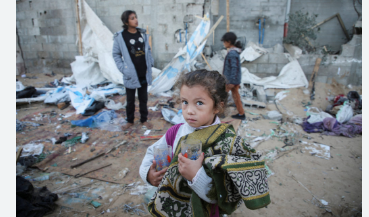New York (Web Desk): The humanitarian crisis in Gaza has reached catastrophic levels, with the situation showing no signs of improvement.
According to the United Nations (UN), more than 46,000 Palestinians have lost their lives since the onset of the conflict in October 2023, with the majority of victims being women and children.
In the past month alone, the region has seen the deaths of eight newborns from the cold, and 74 children have perished due to the brutal winter conditions.
Despite the arrival of the new year, the grim reality of the conflict persists, with little progress made in terms of peace or relief.
Louise Wateridge, a representative from the UN agency for Palestinian refugees, UNRWA, stated that the conditions for civilians, particularly children, remain dire.
"The horrors of last year have carried over into this one, with no end in sight," Wateridge said, highlighting the devastating impact of the ongoing violence and lack of basic needs like warmth and food.
As military operations by the Israel Defense Forces (IDF) continue unabated, large numbers of civilians have been caught in the crossfire, suffering from the widespread destruction and limited access to essential services.
The UN Secretary-General, through his spokesperson, condemned the continuing harm to innocent lives and reiterated the need for an immediate ceasefire.
The situation on the ground has also led to a severe food crisis. Humanitarian groups report that food stocks are critically low, with most aid supplies exhausted.
Access to southern Gaza remains heavily restricted, preventing the delivery of much-needed assistance.
Approximately 120,000 metric tons of food, sufficient to support the population for months, is trapped outside Gaza, unable to reach those in need.
With food distribution limited and many community kitchens at risk of closing, millions are facing the prospect of starvation.
Meanwhile, bakeries across Gaza, vital for providing bread to the population, are operating at minimal capacity due to the lack of fuel and resources.
The energy shortages are also crippling the healthcare system, leaving hospitals unable to function properly, especially in the northern part of Gaza, where access remains highly restricted.
Despite these overwhelming challenges, humanitarian workers continue to operate under perilous conditions, providing healthcare to hundreds of thousands.
Between December 22 and January 8, roughly 560,000 individuals received medical care, though the need far exceeds the available resources.
The UN has called on all parties to adhere to international law, emphasizing the protection of civilians and the provision of humanitarian assistance.
There are growing calls for an immediate ceasefire and the release of hostages, as the humanitarian catastrophe continues to unfold.
The international community remains deeply concerned about the ongoing suffering in Gaza and the urgent need for a peaceful resolution.


